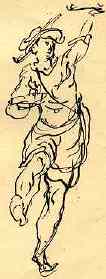Overacting parodied
Shakespeare parodies the excesses of the old drama in the "play within the play" of A Midsummer Night's Dream, where Duke Theseus comments on the ineptitude of Bottom's performance as Pyramus*: "This passion -- and the death of a dear friend -- would go near to make a man look sad." (5. 1. 286-7).
It is true, nonetheless, that the plot of "Pyramus and Thisbe" is very similar to that of the tragedy Romeo and Juliet, written at about the same time.
Listen to Duke Theseus on the power of the imagination.*
Footnotes
-
The passion of Pyramus
Approach ye Furies fell!
O Fates, come, come
Cut thread and thrum;
Quail, crush, conclude, and quell. . .
[Read this line aloud to feel the full force of the fine alliterative fancy.]
Thus die I, thus, thus, thus.
Now am I dead.
Now am I fled;
My soul is in the sky.
Tongue lose thy light;
Moon take thy flight.
Now die, die, die, die, die.
(A Midsummer Night's Dream, 5. 1. 282-304)Pyramus probably dies as dramatically as the stage direction in Cambyses directs: "here let him quake and stir."
-
Imagination
Duke Theseus' impassioned comments on imagination (read here in a reconstruction of Shakespeare's dialect) sound rather like the confession of a poet on the "madness" that overtakes him. (See 5.1.8-22.)P>
